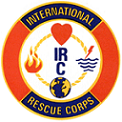| This article needs additional citations for verification. Please help improve this article by adding citations to reliable sources. Unsourced material may be challenged and removed. Find sources: "International Rescue Corps" – news · newspapers · books · scholar · JSTOR (April 2016) (Learn how and when to remove this message) |
 | |
| Founded | 1981 |
|---|---|
| Type | Charity |
| Registration no. | 283031 (England & Wales) SC038213 (Scotland) |
| Focus | Urban search and rescue |
| Location | |
| Area served | Worldwide |
| Members | 160 (as of 2011) |
| Key people |
|
| Website | www |
The International Rescue Corps (IRC) is a volunteer organisation involved in disaster rescue, based in Grangemouth, Scotland. Its motto is "United To Save Life".
Formed in 1981, the IRC has participated in relief efforts during the 1985 Armero tragedy, as well as in the aftermath of the 2003 Bam earthquake, 2005 Kashmir earthquake and 2009 Sumatra earthquakes. It also dispatched teams in response to the February 1998 Afghanistan earthquake and 2011 Tōhoku earthquake and tsunami. In the UK, it has assisted following the Stockline Plastics factory explosion and during the 2009 Cumbria and southwest Scotland floods.
In 2023, it was reported that the IRC had dissolved.
Overview
The IRC is an independent (non-government-funded) United Nations-registered disaster rescue service with an accredited UK National Open College Network qualification in Urban Search and Rescue. As a charity, the IRC is supported entirely by donations from the public and sponsorship from industry. IRC members are unpaid volunteers and all services are provided free of charge – the organisation's sole aim is to save life. The IRC is named after the fictional emergency response organisation International Rescue in the Gerry Anderson TV series Thunderbirds.
The IRC was formed in 1981 in the aftermath of the 1980 Irpinia earthquake and became operational in 1985. Since then, it has undertaken missions in the UK and around the world. In many cases, missions are co-operative efforts working alongside other agencies both nationally and internationally. Overseas missions include several earthquakes, hurricanes and subsequent floods, mudslides and logistical or aid work, whilst UK missions include gas explosions, train crashes, highline rescues, missing person searches and floods.
Training and equipment
Originally, most IRC volunteers were emergency services personnel. Today, they include council workers, union representatives, management consultants, engineers and others.
To carry out the IRC's role, operational members are required to satisfactorily complete a three-year training programme through the UK National Open College Network. Training consists of learning about earthquakes, specialist search-and-rescue equipment, building construction, medical aid and casualty handling, boat handling, advanced rope skills, orienteering and map reading, helicopter coordination, humanitarian logistics and communications. After the first year of training, members can perform supporting roles in local and national missions; only after the full three years (with assessments) can they take part in overseas operations.
Equipment taken by the team varies according to the nature of the disaster. Principal items include thermal imaging cameras, sound detectors, fibre-optic probes, portable generators and lights, cutting equipment, tents, 15 days' supply of food and water purification equipment, enabling the IRC to operate without drawing on the resources of the host country. Satellite communication systems enable the organisation to provide a reconnaissance and coordination service for the UN and other agencies if requested.
References
- "International Rescue Corps 'Ready for Disaster'". BBC News Online. 17 January 2011. Retrieved 13 August 2023.
- "International Rescue Corps Charity Founded by Marlow Man Terry Price Ready to Mobilise for Nepal Earthquake Mission". bucksfreepress.co.uk. 30 April 2015. Retrieved 14 August 2023.
- "About Us". intrescue.info. International Rescue Corps. Retrieved 14 August 2023.
- Treaster, Joseph B. (21 November 1985). "Volcano Rescue Appears to End". The New York Times. Retrieved 13 August 2023.
- Burleigh, James (28 December 2003). "World Races to Aid Stricken Survivors in Disaster Zone". independent.co.uk. Retrieved 13 August 2023.
- Lewis, Stephen (30 October 2009). "The Work of International Rescue with Its Volunteer Training Base at Hawkhills, Near Easingwold". yorkpress.co.uk. Retrieved 14 August 2023.
- "Knowsley Policeman Among Earthquake Rescue Team to Travel to Indonesia". liverpoolecho.co.uk. 13 October 2009. Retrieved 13 August 2023.
- "Rescue Workers Delayed". heraldscotland.com. 10 February 1998. Retrieved 13 August 2023.
- "International Rescue Corps Team Unable to Join Operation in Japan". gov.uk. Foreign & Commonwealth Office. 16 March 2011. Retrieved 13 August 2023.
- English, Shirley (13 May 2004). "International Specialists Use Latest High-Tech Aids". thetimes.co.uk. Retrieved 13 August 2023.
- "Julie Ryan, Of Welburn, Helps Flood-Hit Cumbrian Villages as Part of International Rescue Corps Team". Ryedale Gazette & Herald. 25 November 2009. Retrieved 13 August 2023.
- Dale, Chris (4 December 2023). "International Rescue Corps Dissolved After More Than 40 Years' Service". gerryanderson.com. Anderson Entertainment. Retrieved 9 January 2025.
- Ward, Cassidy (29 November 2023). "Remembering the Innovation and Imagination of Sci-Fi Puppet Show Thunderbirds". syfy.com. Retrieved 28 August 2024.
- "International Rescue Corps Details". United Nations Office for the Coordination of Humanitarian Affairs (OCHA). Archived from the original on 24 October 2007. Retrieved 9 June 2009.
- "UK Awarding Organisation - Educational Qualifications". NOCN.org.uk. 30 March 2016. Retrieved 10 April 2016.
Bibliography
- "Scots rescuers reach Iran". BBC News Online. 27 December 2003. Retrieved 9 June 2009.
- "International Rescue answers call". BBC News Online. 11 May 2004. Retrieved 9 June 2009.
- Ryan, Julie (19 October 2005). "International Rescue Feature: Rescue mission in Pakistan". BBC News Online. Retrieved 9 June 2009.
External links
- Official website
- "Introducing the Real Thunderbirds Squad", The Times (subscription required)
| Thunderbirds | |||||||||
|---|---|---|---|---|---|---|---|---|---|
| Main characters | |||||||||
| Vehicles and locations | |||||||||
| Episodes | |||||||||
| Derivative works |
| ||||||||
| See also | |||||||||